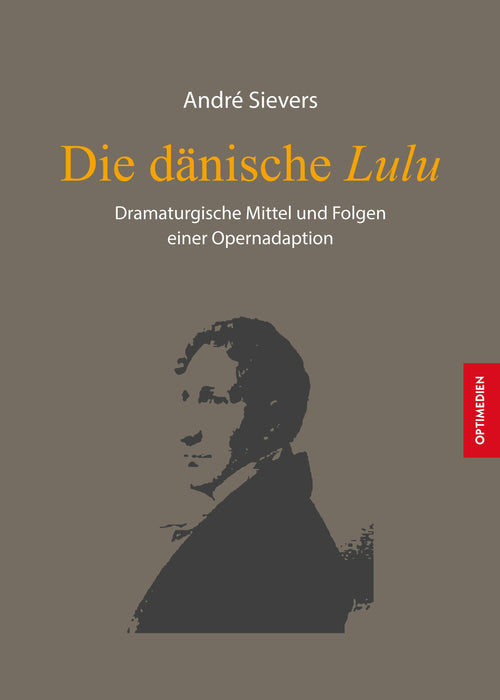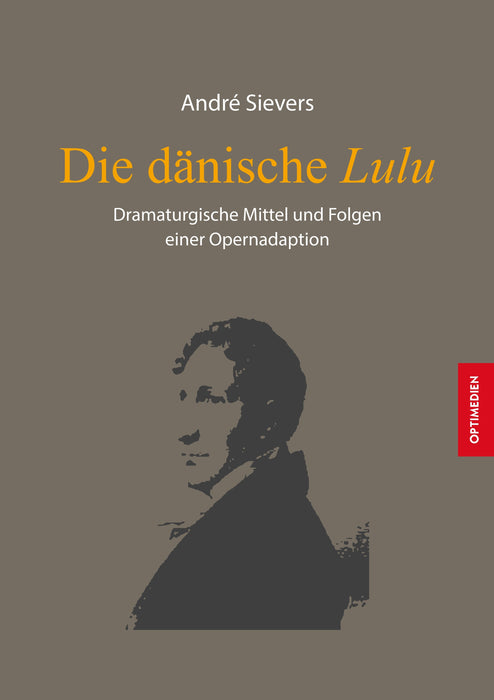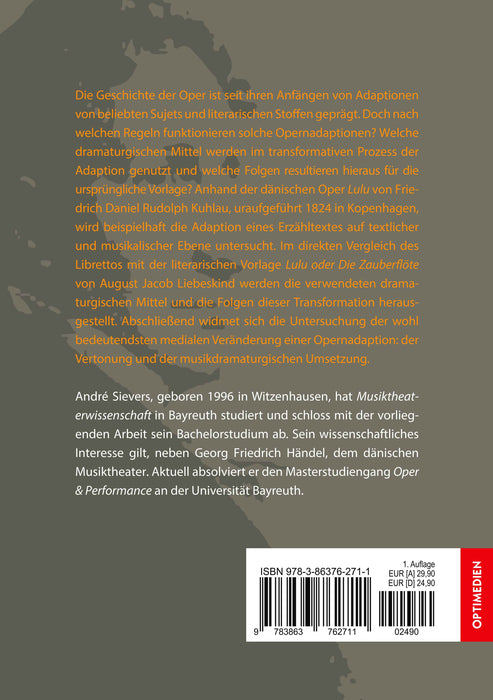The Danish Lulu. Dramaturgical means and consequences of an opera adaptation
- Brand: Sievers, André
- Availability: In stock
- SKU: 9783863762711
€24,90
Since its beginnings, the history of opera has been shaped by adaptations of popular subjects and literary material. But according to what rules do such opera adaptations work? Which dramaturgical means are used in the transformative process of adaptation and what are the consequences for the original template? Based on...
Since its beginnings, the history of opera has been shaped by adaptations of popular subjects and literary material. But according to what rules do such opera adaptations work? Which dramaturgical means are used in the transformative process of adaptation and what are the consequences for the original template? Based on the Danish opera Lulu by Friedrich Daniel Rudolph Kuhlau, first performed in Copenhagen in 1824, the adaptation of a narrative text is examined on a textual and musical level. In a direct comparison of the libretto with the literary template Lulu oder Die Zauberflöte by August Jacob Liebeskind, the dramaturgical means used and the consequences of this transformation are highlighted. Finally, the examination is devoted to what is probably the most important change in the media of an opera adaptation: the setting and the musical dramaturgical implementation.
Details
- Title: The Danish Lulu
- Subtitles: Dramaturgical means and consequences of an opera adaptation
- Author: André Sievers
- Edition: 1st edition
- University: University of Bayreuth
- Grade: 1.6
- Product Type: Book (Hardcover)
- Product type: bachelor thesis
- Language: German
- Binding: Softcover (paperback)
- Dimensions: 21.0 x 14.8 cm (DIN A5)
- Scope: 130 pages
- Condition: New (shrink-wrapped in foil)
- Keywords: Adaptation Studies, adaptation, The Magic Flute, dramaturgy, Denmark, Danish opera, Danish music theatre, narrative text, intermediality, Kuhlau, libretto, Lulu, media change, Mozart, music, music dramaturgy, music theatre, musicology, opera, opera studies, Opera adaptation, theater studies, transformation, transformation process, scoring
Author
André Sievers, born in Witzenhausen in 1996, studied music theater studies in Bayreuth and completed his bachelor's degree with this thesis. In addition to George Frideric Handel, his scientific interest is in Danish music theatre. He is currently completing his master's degree Opera & Performance at the University of Bayreuth.
Table of Contents
1 introduction
2 Basics of an opera adaptation
2.1 Opera adaptations as media change
2.2 Opera adaptations as a transformation process
2.2.1 The libretto of narrative texts
2.2.2 The setting of the libretto<51> 2.2.2 The setting of the libretto
3 Friedrich Daniel Rudolph Kuhlau: Lulu
3.1 Creation and reception
3.2 The libretto
3.2.1 Preliminary remarks on the structure
3.2.2 Comparison of template and libretto
3.3 The setting
3.3.1 Orchestral and voice cast
3.3.2 Music dramaturgical analysis
4 Closing words and outlook
Bibliography
attachment
Downloads
DRM: Digital Watermark
This eBook contains a digital watermark and is therefore personalized for you. If the eBook is passed on to third parties abusively, it is possible to trace it back to the source.
File format: PDF (Portable Document Format)
With a fixed page layout, the PDF is particularly suitable for specialist books with columns, tables and figures. A PDF can be displayed on almost all devices, but is only suitable to a limited extent for small displays (smartphone, e-reader).
System requirements:
PC/Mac: You can read this eBook with a PC or Mac. You need a PDF viewer - e.g. Adobe Reader.
eReader: This eBook can be read with (almost) all eBook readers. However, it is not compatible with the Amazon Kindle.
Smartphone/Tablet: Whether Apple or Android, you can read this eBook. You need a PDF viewer - e.g. Adobe Reader.
Buying eBooks from abroad
For tax law reasons we can sell eBooks just within Germany and Switzerland. Regrettably we cannot fulfill eBook orders from other countries.



